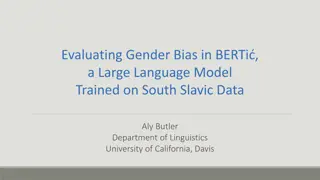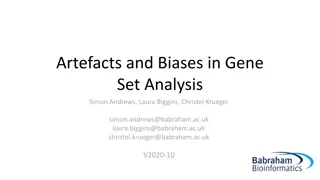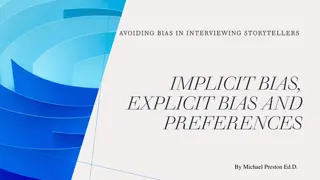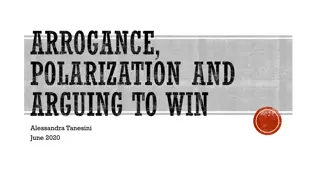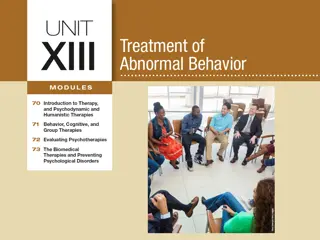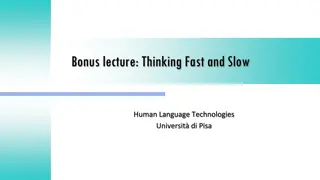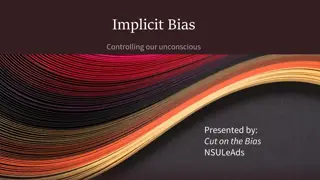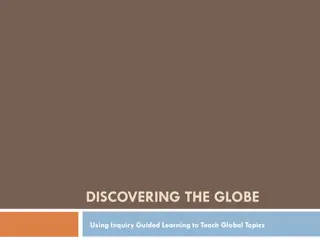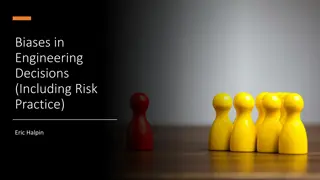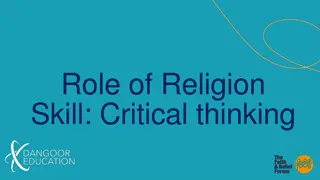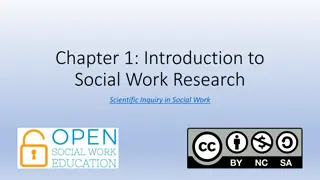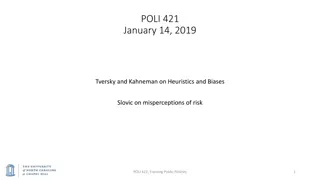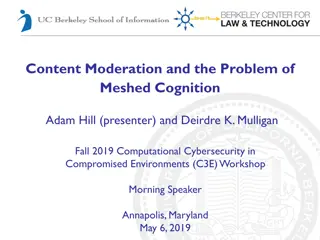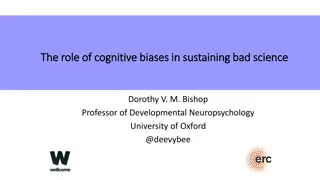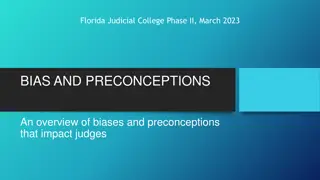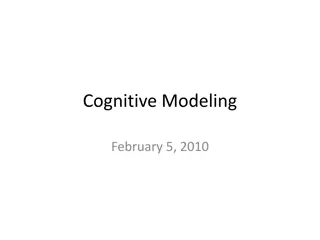Cognitive Load Classification with 2D-CNN Model in Mental Arithmetic Task
Cognitive load is crucial in assessing mental effort in tasks. This paper discusses using EEG signals and a 2D-CNN model to classify cognitive load during mental arithmetic tasks, aiming to optimize performance. EEG signals help evaluate mental workload, although they can be sensitive to noise. The
0 views • 19 slides
Understanding Intersectionality in AI: Analyzing Biases in Generative Systems
Machine learning in AI can perpetuate biases related to race and gender. This workshop explores the concept of intersectionality to analyze how AI-generated avatars represent identities based on race, gender, and ethnicity. Participants will learn to recognize biases in generative AI and develop cri
4 views • 25 slides
Brain Mineral Deposition and Cognitive Decline Study
Investigating the progression pattern of brain mineral deposition as a differential indicator of cognitive decline in individuals with varying cognitive statuses from normal to Alzheimer's disease. The study aims to develop improved imaging techniques and specific cognitive-relevant atlases to under
4 views • 24 slides
Evaluating Gender Bias in BERTi: Insights on Large Language Models
This study delves into gender bias evaluation in BERTi, a large language model trained on South Slavic data. It explores issues in language modeling, the impact of social biases in artificial intelligence, and training processes of Large Language Models (LLMs). Additionally, it discusses how LLMs le
11 views • 16 slides
Understanding the Cognitive Assessment System (CAS2) Theory and Applications
The Cognitive Assessment System (CAS2), developed by Dr. Jane Yeomans, is a comprehensive tool for assessing cognitive processes in children aged 5 to 18. Unlike traditional IQ tests, CAS2 focuses on areas like Planning, Attention, Simultaneous, and Successive processing. It requires Level 2 qualifi
1 views • 29 slides
Understanding Artefacts and Biases in Gene Set Analysis
Gene set enrichment tests help identify functional gene sets enriched in hit lists compared to background sets. Various biases (technical, biological, statistical) can lead to incorrect conclusions in data analysis, emphasizing the importance of recognizing and addressing them. Technical biases like
0 views • 29 slides
Understanding and Overcoming Bias in Interviewing
Bias in interviewing can arise from implicit and explicit prejudices, impacting perceptions and interactions with interviewees. Implicit biases are unconscious, while explicit biases are deliberate. Recognizing and addressing biases is essential to conduct fair and effective interviews. Examples ill
0 views • 17 slides
Understanding Cognitive Behavioral Therapy (CBT) by Dr. James Ikonomopoulos
Explore the foundations and application of Cognitive Behavioral Therapy (CBT) through the work of Dr. James Ikonomopoulos. Uncover the connection between thoughts, feelings, and behaviors, learn cognitive and behavioral interventions for children and adults, and delve into the cognitive model of the
0 views • 64 slides
The Impact of Arrogance and Polarization on Group Deliberation
Individuals' biases and tendencies towards arrogance and overconfidence can hinder good group deliberation. The motivation to argue for learning, rather than winning, contributes to better group discussions. Understanding biases as features rather than bugs can lead to improved group judgment. Indiv
0 views • 19 slides
Understanding Cognitive Testing in Aging: A Vital Assessment Tool
Cognitive testing plays a crucial role in assessing cognitive abilities and distinguishing normal aging from disease states in older adults. This program, a partnership between OneWorld and UNMC's Geriatrics Workforce Enhancement Program, highlights the importance of cognitive testing, its objective
0 views • 17 slides
Introduction to Cognitive Behavioral Therapy (CBT) for Beginners
Delve into the origins, principles, and applications of Cognitive Behavioral Therapy (CBT) through an exploration of its history, theory, and practical skills. Learn how CBT targets cognitive distortions and behaviors to enhance mental health and develop coping strategies. Discover the fundamental a
0 views • 23 slides
Evaluating the Effectiveness of Psychotherapy: Evidence and Critiques
Evidence suggests that psychotherapy works for many individuals, with high satisfaction rates reported. Critics, however, raise concerns about placebo effects, therapist biases, and human biases influencing perceptions of success. Clinicians acknowledge successful cases but remain cautious of cognit
0 views • 36 slides
Understanding Human-Computer Interaction and Cognitive Learning Theories
Human-Computer Interaction (HCI) focuses on how people interact with computers, while theories like Sweller's Cognitive Load Theory and Mayer's Cognitive Theory of Multimedia Learning explain how individuals process information. These theories emphasize optimizing learning by managing cognitive load
4 views • 8 slides
Cognitive Stimulation Therapy in Post-Acute Care: A Pilot Study
Cognitive Stimulation Therapy (CST) is an evidence-based group intervention designed for individuals with mild to moderate cognitive impairment. It aims to enhance cognitive functioning through various activities such as executive functioning tasks, multi-sensory stimulation, and reminiscence work.
0 views • 9 slides
Predictive Performance of CSF A1-42 and Tau on Cognitive Decline and Dementia Progression
Analysis conducted at the Perelman School of Medicine, University of Pennsylvania, evaluated the predictive performance of cerebrospinal fluid markers A1-42, t-tau, and p-tau181 on cognitive decline and progression to dementia. The study included 2401 ADNI1/GO/2 CSF samples from individuals across d
0 views • 19 slides
Cognitive Behavioral Therapy for Psychosis: Concepts and Applications
Explore the foundational principles of Cognitive Behavioral Therapy (CBT) for psychosis, emphasizing how thoughts influence feelings and behaviors. Gain insights into the cognitive-behavioral model of paranoia and learn about the main tenets of CBTp. Discover how CBTp can effectively address psychot
0 views • 63 slides
Early Childhood Language Learning and Bilingualism
Early childhood is a critical period for language acquisition and the development of bilingualism. Exposure to multiple languages from a young age has significant cognitive benefits. Bilingualism is a common phenomenon worldwide, with many individuals speaking more than one language. The cognitive i
0 views • 109 slides
Brain Health Messaging for Health Education: Promoting Cognitive Well-being
Evidence-based programs for older adults focus on managing health conditions that are risk factors for cognitive decline, such as diabetes, smoking, and heart disease. By incorporating cognitive health messages into promotions, individuals are encouraged to address these risk factors early to suppor
0 views • 5 slides
Understanding America Study: Cognitive Functioning Measures
The Understanding America Study (UAS) focuses on developing web-based cognitive functioning measures, including tests for fluid abilities, verbal skills, executive function, and processing speed. Utilizing data from about 9,000 panelists, tests like the Stop and Go Switch task are administered onlin
0 views • 26 slides
Cognitive Biases and Decision Making: An Exploration of Human Psychology
Explore the fascinating realm of cognitive biases and decision-making through various mind-bending puzzles and scenarios. Dive into concepts such as fast and slow thinking, logical reasoning, and the impact of biases on our everyday choices. Challenge your cognitive reflection with intriguing questi
0 views • 14 slides
Understanding Implicit Bias and Overcoming Negative Biases
Implicit bias influences attitudes and behaviors unconsciously. Learn about its key characteristics, testing methods like the Implicit Association Test, and how to combat negative biases through mindfulness techniques. Explore real-world examples and strategies to address biases effectively.
0 views • 19 slides
Understanding Psychological Challenges in Teaching Global Perspectives
Exploring the impact of psychological biases like actor-observer bias, confirmation bias, and cognitive dissonance on teaching global perspectives. Insights from James Dawes shed light on how our perceptions and judgments are influenced by internal biases, affecting our ability to embrace diversity
0 views • 31 slides
Addressing Cognitive Dysfunction in Patients with Cancer: Causes, Impact, and Treatment
Understanding cognitive dysfunction in cancer patients is crucial for improving quality of life and medical outcomes. This article explores the background, causes, screening, diagnosis, and treatment options for cancer-related cognitive impairment, emphasizing the historical perspective, prevalence,
0 views • 60 slides
Managing Biases in Engineering Decisions - Strategies and Tools
Dive into the complexities of biases in engineering decisions, particularly in risk assessment, and explore ways to identify, understand, and manage biases effectively. Discover insightful strategies, responsibilities, and tools to mitigate biases and enhance decision-making processes in engineering
0 views • 11 slides
Master Programmes in Artificial Intelligence for Human-Centric AI Careers
Explore the world of Cognitive Systems and Cognitive Programming for Human-Centric AI at the University of Cyprus. Delve into building systems that think and behave like humans, learn from experiences, and adapt to changing circumstances. Discover the ethical considerations of Cognitive Systems and
0 views • 17 slides
Enhancing Critical Thinking Through Examining the Role of Religion
Explore the role of religion in developing critical thinking skills by identifying biases, critically evaluating information sources, and fostering nuanced perspectives. Reflect on personal biases, sources of information, and engagement with controversial issues. Enhance critical thinking by analyzi
0 views • 12 slides
Enhancing Engagement and Addressing Biases in Family-Centered Support
Explore the significance of active listening, engagement, and combating biases in supporting families within the child welfare system. Learn about the importance of involving parents and caregivers, understanding biases, and implementing strategies to reduce implicit bias. Emphasizing family voices
1 views • 18 slides
Understanding Cognitive Disorders in Psychiatry: A Comprehensive Overview
Cognitive disorders disrupt higher brain functions, impacting memory, attention, and decision-making abilities. This article explores the classification of cognitive disorders, focusing on delirium, a common syndrome characterized by consciousness disturbance and cognitive changes. Delirium predomin
0 views • 26 slides
Understanding Social Work Research and Evidence-Based Practice
Explore the significance of social work research, cognitive biases, objectivity vs. subjectivity, and evidence-based practice. Learn how social workers gather knowledge, apply cognitive biases, distinguish between subjective and objective truths, and utilize evidence-based practice to enhance client
0 views • 9 slides
Enhancing Cognitive Flexibility for Employability
Cognitive flexibility is a crucial skill for adapting to new situations and problem-solving in today's competitive job market. This module focuses on identifying, assessing, and enhancing cognitive flexibility to nurture competitiveness and employability. Learn how to recognize the importance of cog
0 views • 24 slides
Cognitive and Behavioral Management Strategies for Traumatic Brain Injury Patients
This presentation focuses on addressing challenging cognitive, behavioral, and personality issues associated with traumatic brain injury (TBI). It outlines cognitive issues such as attention, speed of processing, learning, memory, and executive functioning. Cognitive management strategies include te
0 views • 18 slides
Impact of Yoga on Cognitive Functioning in Aging Adults
Aging is often accompanied by a decline in cognitive functions, affecting areas such as memory, attention, and reasoning. This article explores the relationship between aging and cognitive impairment, along with various treatment options including drug therapy, dietary interventions, and cognitive e
0 views • 42 slides
Understanding Cognitive Biases in Decision Making
Explore Tversky and Kahneman's research on heuristics and biases, Slovic's insights on risk misperceptions, and the implications of cognitive biases in decision-making processes. Delve into topics such as representativeness, availability bias, anchoring, and Prospect Theory by Kahneman and Tversky.
0 views • 12 slides
Evolution of Cognitive Counseling and Aaron T. Beck's Contribution
In the historical context following World War II, a shift occurred in psychology towards cognitive counseling with the emergence of cognitive therapy by Aaron T. Beck. Beck, a psychoanalytically trained psychiatrist, challenged traditional psychoanalytic concepts and developed cognitive therapy to t
0 views • 26 slides
Challenges in Content Moderation and Cognitive Performance
The content discusses the impact of global social information environment and human-centric cyber vulnerabilities on cognitive performance. It emphasizes the erosion of cognitive abilities due to biases, diminished critical thinking, and exposure to covert exploitation. The dynamics are observed in
0 views • 27 slides
Cognitive Biases in Sustaining Bad Science
Cognitive biases play a significant role in perpetuating bad science by influencing the way research is conducted. Inaccurate interpretations of data, confirmation bias, and selective attention/memory can lead to flawed conclusions. The Academy of Medical Sciences highlights the need for better trai
0 views • 38 slides
Understanding Biases and Preconceptions in Judicial Decision-Making
Explore the impact of biases and preconceptions on judges, including definitions of bias, prejudice, and implicit bias. Learn how past experiences can influence judicial duties and the importance of judges being aware of their perspectives. Discover exercises to identify biases and potential issues
0 views • 12 slides
The Relationship Between Cognitive Flexibility and Psychological Flexibility After Acquired Brain Injury
This study explores how cognitive flexibility and psychological flexibility interact after an acquired brain injury. It examines whether individuals who exhibit cognitive inflexibility can achieve psychological flexibility, considering the impact of cognitive impairments post-injury. Cognitive flexi
0 views • 21 slides
Unpacking Biases and Tackling ISMs in Life
We all carry biases and opinions that influence our decisions. Learning to separate bias from stereotype is crucial for making informed choices. This course delves into identifying and addressing biases to combat ageism, sexism, racism, classism, and homophobia in society.
0 views • 10 slides
Understanding Cognitive Modeling in Learning Sciences
Cognitive modeling is a key aspect of simulating human problem-solving and mental processes in computerized models. It involves the use of various types of cognitive models, such as production-rule systems and constraint-based models, to predict human behavior and performance on tasks. This field en
0 views • 83 slides



